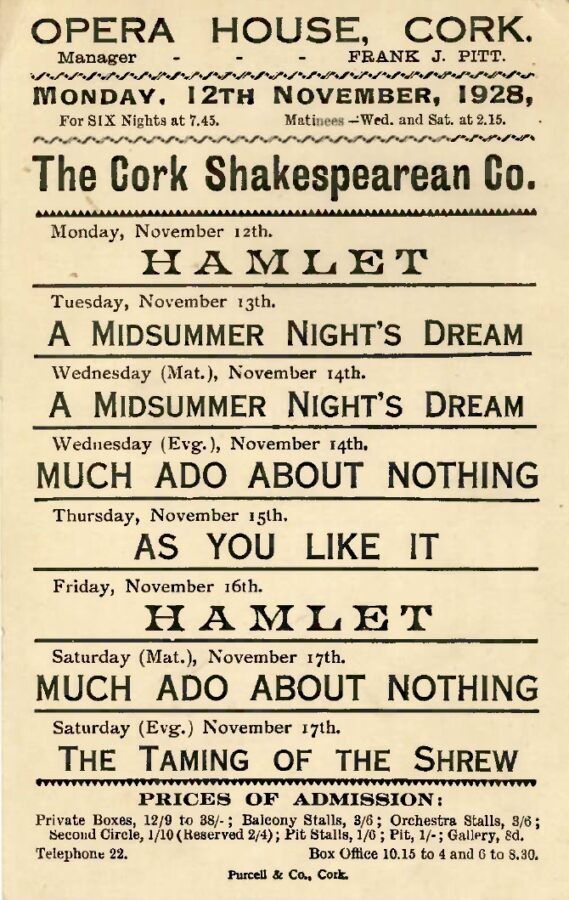
Kieran’s Our City, Our Town Article,
Cork Independent, 23 January 2025
Making an Irish Free State City – Fr O’Flynn & the Cork Opera House Week
In early May 1927 Fr O Flynn rented Cork Opera House and staged a week-long season of six Shakespearean plays. Large scale financial investment was made and a large effort was made to assemble daily audiences. There were six evening performances and one matinee performance. The plays Richard II, Twelfth Night, Hamlet, The Merchant of Venice, Othello and Richard III were all performed by players who played different characters in these plays.
The worst fears of the Cork Shakespearean Company were seen on the first night. Richard II was played before an attentive audience, but not as large the Company wished for. The big influence on this was the fine weather that Corkonians began to enjoy that week. The Cork Examiner on the following day (on 3 May) praised the production; “The public are still apt to look with suspicion on what is slightingly referred to as ‘local talent’, but even the most hardened Philistine, must be converted by the wonderfully fine work of this enterprising society. When an unfamiliar historical play such as Richard II can be staged so well that it evokes enthusiastic applause, as it did last night, the public can he assured of a faultless rendering of the more popular Shakespearean plays which will be seen during the week…Taken all round, the production would be considered highly creditable even for a professional company.
On Tuesday 3 May, Twelfth Night was performed. The news report in the Cork Examiner, the day after, reported that the audience enjoyed the performance; “The reception, which a representative and discriminating audience gave to Twelfth Night, shows that a lighter comedy capably produced will not only please, but captivate a public. Of course, much depends upon the players, and how they can enter into the spirit of the piece…Last night’s performance was a treat for all who love Shakespeare. There was not a dull moment from start to finish. The play went with a swing, and the audience were not slow to appreciate the fact that they were listening to artists who had clearly given thoughtful preparation to the work and many of whom could hold their own against recognised professionals”.
On Wednesday, 4 May for Hamlet a very large crowd of school children, boys and girls, occupied the gallery of Cork Opera House and remained chatting throughout the performance. The following day, the Cork Examiner praised the resilience the actors who continued to perform through much noise; “The highest compliment that can be paid to the Cork Shakespearean Company is that last night they gave an excellent interpretation of Hamlet under conditions that at times would have been regard as intolerable by the most seasoned professional touring company. A very large crowd of school children, boys and girls, occupied the gallery, a circumstance in itself highly satisfactory as evidence of the interest in classical drama aroused by the influence of their teacher or those who prescribe books for examinations. But the conduct of the youthful galleryites last night was such as to give one the impression that a little more attention should be given to the teaching of manners in the school or the homes”.
Fr O’Flynn wrote to the Cork Examiner and defended the young people’s chattering; “They came to see the ghost. And the pictures have trained them to express themselves aloud. They aro not to blame. They have not had the stage that trained the older generation. We felt inclined to relieve the congestion in the gallery by filling the boxes with these little spiritual ones who came to see a ghost. These are the ones who in after years fill boxes to enjoy true art. We forgive them heartily”.
On Friday 6 May the Company performed their Othello. The play was broadcast from the stage on local radio through the Cork Broadcasting Service.
If 1927 was a major project, the ambition for 1928 far exceeded it. In one week in November 1928, Fr O’Flynn and the Cork Shakespearean Company staged six Shakespearean plays across six evenings and two matinees. They staged Hamlet (Monday evening), A Midsummer Night’s Dream (Tuesday evening and Wednesday matinee), Much Ado About Nothing (Wednesday evening and Saturday matinee), As You Like It (Thursday evening), Hamlet (Friday), The Taming of the Shrew (Saturday evening). Some of the young actors took part in every one of the eight performances during that week in 1928.
In a 1928 programme note, Fr O’Flynn wrote about a labour of love for Shakespeare; “From our Loft in Musgrave Place we bring eight or works of art – our reason for so many is just love for work, and that the stars in one play may be given the part of a soldier, servant or noises of in some other to advance the aspiring stars a little further on their way. No company in the world, for pay, would undertake a week like this; with us it is a pleasure, a labour of love”.
The Committee of the Cork Shakespearean Company in 1928 comprised Fr O’Flynn, President; Mr Gus Healy, Chairman, Mr M McCarthy, Honorary Secretary; Mr Tom Vesey, Treasurer; Mr L O’Connell, Mr Ted Healy, Stage Manager, Misses Eileen Curran, Rita Coughlan and P Murphy.
From 1927 to 1932. Fr O’Flynn’s Shakespearean seasons were a highlight of the year’s programme at the Opera House. For the young actors the rehearsals were very time-consuming and made heavy demands on their loves. In addition, at performances audience numbers fluctuated, but media responses were positive and supportive. The change to later times of year for performances such as November instead of May created more of an audience attendance as well.
Caption:
1288a. Cork Shakespearean Programme flyer for Cork Opera House, November 1928 (source: Cork City Library).